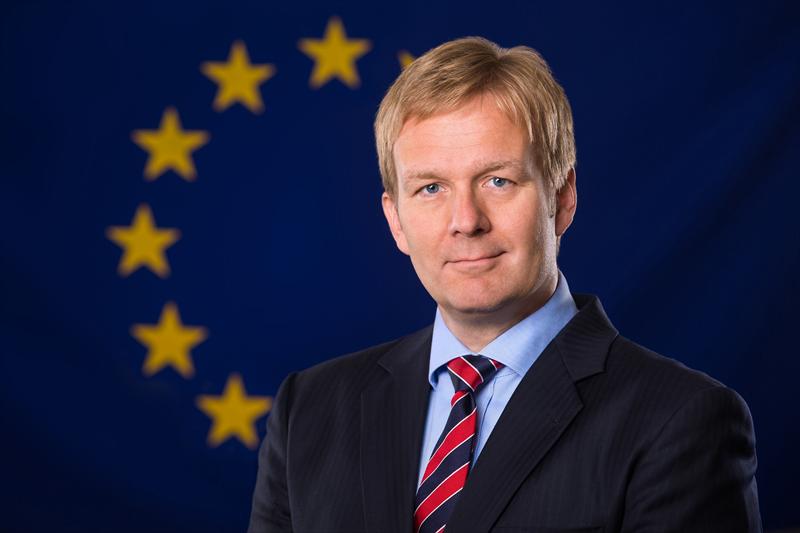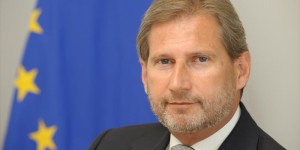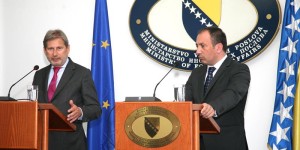1. The EU Parliament’s Foreign Affairs Committee adopted a report on BiH, which stipulates that there is no progress, that the EU should be more engaged in resolving the problems in the country and that Dayton is not functional. BiH authorities were invited, for an umpteenth time, to implement a comprehensive reform of the Constitution. Do you think that the major political parties in BiH will turn a deaf ear to this invitation once again or take it seriously, as you have already warned?
The European Parliament represents the stances of the elected representatives of EU. Its resolutions should be taken seriously – and I hope the BiH institutions at all levels will do so.
2. The examples of the neighbouring countries should be a lesson for BiH politicians, i.e. that a compromise can result in progress on the EU integration path. However, the recent talks of BiH politicians pertaining to the implementation of the Sejdić – Finci ruling, which is the key requirement for BiH’s credible application for the EU membership demonstrated that extreme positions prevail over willingness to agree, which will become more prominent in this year of elections. What are your recommendations in terms of overcoming this situation? So, how to shift from a declarative stage to an operational stage and implement the necessary reforms?
We have indeed seen in other countries in the region that the prospect of EU membership has led to a consensus between political forces. Agreements have been made, and tough decisions taken, on the basis that all forces in those countries have a serious commitment to EU integration.
As we have seen, countries such as Croatia, Serbia, Montenegro have all advanced in the accession process – showing that the EU rewards reform and action.
It is still not too late for the political leaders to turn their declared commitment into agreement and concrete action. It is in the interest of Bosnia and Herzegovina’s citizens that they do so and the citizens should demand it.
3. The public is clear in its view that an attempt is being made to resolve through the Sejdić – Finci ruling what it actually does not demand, i.e. eliminate discrimination, but the so-called “Croat issue”. According to the statements given by most of the politicians, the main culprit for the failure to implement the ruling is the HDZ BiH president Dragan Čović. Since you have been an active counterpart in the talks with the leaders of the parties, could you confirm the thesis that Čović keeps raising the bar and seeks to achieve more than is realistic?
I am not in the business of pointing fingers because it is not helpful. If any of the leaders or parties want to address other internal issues in this process, it’s their responsibility as they are accountable to the citizens in the forthcoming elections. Any idea that the EU is in favour of one or another group is wrong.
The judgment needs to be implemented because we want BiH as one sovereign and united country to join the EU. The EU’s readiness to help – as we have been doing until now – is as strong as it was when I arrived in 2011. The leaders and the institutions have to keep working to find an agreement.
The EU has highlighted the problems of credibility for BiH posed by non-implementation of this judgment of the ECHR. And it remains the case – this issue will not go away.
We have also said that the holding of general elections must not be jeopardised and democracy should continue. I am very pleased that the EU was able to make a contribution with our advice to the recent passage of amendments to the Election Law in relation to territorial organization, which was a fundamental requirement for elections to go ahead.
4. BiH seems to find it an insurmountable hurdle to allow all citizens to choose and be chosen irrespective of their ethnic or religious background. Years of insisting and efforts invested by high EU officials have changed nothing. As a European and democrat, do you find it absurd that a never-ending debate has been ongoing about something that is uncivilised?
It certainly should have been resolved sooner by those with the responsibility to do so. It is the politicians who shape the politics of the country.
Nonetheless, here in BiH, we do what the EU does between its member states and around the world – we help people who need to find an agreement, to find an agreement. So they can move on to the very many other challenges out there especially in the economy.
5. Some pundits warn that a solution for the Sejdić – Finci ruling cannot be found with the mediation of the European Commission since the ruling of the Court in Strasbourg is under the jurisdiction of the Council of Europe and not the European Commission or EU Enlargement Office. It is pointed out that it is a systemic mistake that the European Commission has taken in upon itself to deal with a case that falls outside of its competence. How do you comment these statements? Does the European Commission have a part of responsibility for the failure to implement the ruling?
This is very much a matter for the European Commission because application of the European Convention on Human Rights is also part of Bosnia and Herzegovina’s Stabilisation and Association Agreement with the EU.
In addition, implementation of this judgment has been declared a political condition by the Council, and this was restated in October last year in the Foreign Affairs Council conclusions. Until this is done, BiH’s progress towards the EU cannot be unlocked.
BiH should not doubt the endurance of the EU – our whole system is based on working continuously until we find agreement and on holding firm to our conditions.
6. Again according to pundits, the USA intends to take on the lead role in mediating between BiH forces in resolving the key political dilemmas, but only in case the EU efforts to resolve the political intricacies inherent to the required changes of the BiH Constitution reflecting the Sejdić – Finci ruling fail. Will the EU tire of BiH? To which extent would the potentially higher involvement of the US diplomacy contribute to resolving the key political problems in BiH?
The EU is not the issue here. Our support is already ensured and strong. The issue is whether we have credible interlocutors, whether we will see leadership from the most prominent BiH politicians to make progress on the EU path.
I want to be clear as well that EU integration will not stop because of national elections. The EU agenda remains fully active in 2014 and is an issue that really must be above the daily and electoral politics. You can be sure that we will be active also with other partners such as civil society, citizens and the media during this year to keep the EU issues in focus.
We do not want to see BiH lagging behind, we want the country to join the EU, but the choice is yours. The speed of Bosnia and Herzegovina’s EU integration depends ultimately on the country’s progress in EU related reforms, in effect on the country’s leaders and on the citizens who vote for them.
7. The political crisis in the country certainly affects the economy. In which area is there a chance for economic recovery of the country? How to make it a fruitful soil for new investments?
The economy of Bosnia and Herzegovina faces some serious challenges, not only in terms of economic performance but much more from the lack of commitment to reform and structural adjustment. If there is no progress in structural reform in key areas, we will not see positive developments. Of course maintaining macro-economic stability is also fundamental.
Investment, foreign as well as domestic is needed. BiH needs to free up the investment space for private business, which means reducing the public sector; it needs to get the regulators up and running with necessary independence and operational requirements. It should in particular focus on energy and transport and doing so Bosnia and Herzegovina is not alone in these endeavours.
8. Unlike Croatia or Serbia, which are decisive when it comes to breaking linked with tycoons connected with suspicious activities or politicians, in BiH this link comes almost naturally. There almost no results in the area of fighting organised crime, and corruption has permeated every pore of the society. Progressing towards the EU includes more than resolving the issue of corruption. Are BiH authorities afraid of progressing towards the EU as they would obviously put themselves at risk?
The EU is totally committed to the fight against corruption. That’s why the overall EU targeted support to the fight against corruption in Bosnia and Herzegovina amounts to around 11 million EUR.
A lot of this is to strengthen institutions – that’s important – but the citizens need to be part of it and believe in it as well. Fighting corruption is not a government task alone. So we are also supporting projects which are implemented by civil society organisations. Without non-governmental organisations and the media an anti-corruption agenda cannot be successful. Another top priority of current and future EU support is the seizure of assets and the management of confiscated assets.
Specifically, there is an insufficient track record of investigation and prosecution in high-profile cases. So, bigger efforts and political will are needed regarding the fight against corruption. What will help for the future is for political actors to ensure conditions that allow law enforcement agencies and other institutions to implement the law without obstruction.
9. A survey conducted by the DEI shows that 80% of BiH citizens have a positive attitude towards our country’s membership in the EU. However, as of recently, there have been statements questioning BiH’s EU future, there has been a mention of the economic crisis in the EU, that the situation there is not what it used to be a few years ago. At the end of our interview, what is your message for BiH citizens?
In 2014 I truly hope we can see the leaders reach agreement on implementation of the judgment of the ECHR, eliminating discrimination in the BiH Presidency and House of Peoples. I also want to underline that our work will not stop because of national elections – there is lots to do on the EU agenda: promoting the rule of law, reforming the economy and promoting human rights.
I hope that as many citizens as possible will go to the polls in October 2014 to have their say.
People need to know that the EU remains committed to the European perspective of Bosnia and Herzegovina and the Western Balkans. Europe is the only place where BiH belongs. And Europe isn’t Europe without all its parts.




